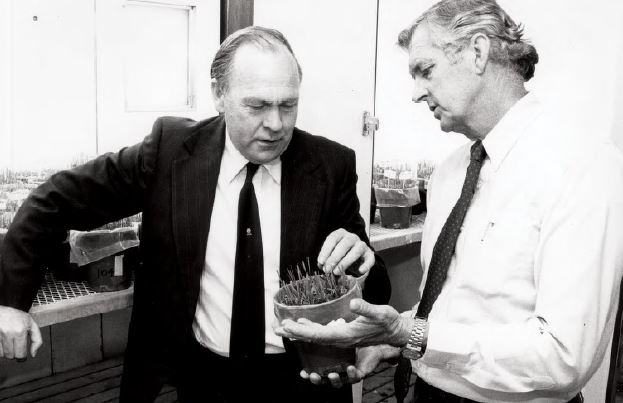Agronomy prize grew in fertile soil
UNE’s first Professor of Agronomy and third Vice-Chancellor, Alec Lazenby AO, grew up in Yorkshire, the son of tenant farmers.

During an illustrious academic career, including associations with nine universities on two continents, Alec Lazenby has never forgotten the generosity that shaped his career trajectory.
A typical, if talented country boy, Alec received scholarships to attend both his local grammar school (Wath-on-Dearne) and university. After what he describes as a “conversion moment”, he turned down an offer to study history and politics at coveted Cambridge University in favour of reading agriculture at the more provincial Aberystwyth, then a college of the University of Wales. This decision was not well received by his headmaster, but proved a pivotal moment.
Alec went on to work at Aberystwyth’s plant breeding station for four years after graduation and to become a highly respected agricultural scientist. And he did eventually “take a couple of degrees” at Cambridge, where he worked as a demonstrator and lecturer for 12 years.
“My entire career depended on scholarships,” Alec recalls. “Remember this was just after the Great Depression and things were very, very tight for every family, particularly farming families. I appreciate now that education is vital for an individual to develop his or her potential. For me, scholarships were the only way I could continue my studies.”
This profound impact is what prompted Alec to offer a prize for the best third-year agronomy student at UNE 47 years ago, when he left to return to the UK as director of the Institute of Grassland and Environmental Research. By then he had completed five years as Professor of Agronomy (the first such chair in Australia) and another seven as VC, from 1970-77. The prize, now endowed, has been given every year since.
“I will always empathise strongly with UNE because it is so indicative of my own country upbringing; UNE was the first regional university in Australia, set up primarily to provide education for teachers in regional NSW and to develop strengths relevant to rural industries,” Alec says. “Later, when I had some spare cash, I wanted to support that. The scholarship is a relatively small drop in a much bigger ocean, but at least one can provide a little bit of help.”
Even when appointed VC, Alec continued teaching agronomy, to “keep in touch with students”. His tenure was a period of great expansion on campus, characterised by the construction of several major buildings. It was also the 1970s and a time of student unrest.
“I was lucky that Armidale didn’t have a television station when students were rebelling against exams,” Alec says. “They wanted continual assessment, instead of one final exam. Now I happen to believe it is important that students have a voice and I was always fortunate throughout my whole time as VC to have very good relations with students.
“The protest started out very good-natured at first. Some students came into Booloominbah, and I even had a drink with them and played cards for a while, but it was obvious they were not going to leave. I said to them, ‘if you are not out by 9 o’clock tomorrow morning I am calling the police’.”
The occupation of the building ended the next day without incident and without loss of face on either side – “It always takes two to tango”, Alec says – and soon after his departure he was honoured when the university’s new hall took Alec’s name. Lazenby Hall has since played host to countless luminaries, performers, graduations and official events.
“Yes, I took the rice bowl around to finance it,” Alec says with a laugh. “The hall was designed not to be like great halls in older, established universities, but to provide a centre not only for university activities but also activities in the New England region. I always felt the university should be, and in fact was, part of the wider Northern Tablelands community.”
Alec went on to become VC of the University of Tasmania (from 1982-91) and was made an Officer of the Order of Australia in 1988 “for service to learning”. He also received the Centenary Medal in 2001 “for service to Australian society in rural science and technology”. Now an Emeritus Professor at UNE and 94 years old, Alec says he looks back on his time at the university with fondness.
“I will always empathise very strongly with the University of New England because it was my type of university,” he says. “I enjoyed being Professor of Agronomy and building up the department from scratch; in many ways that was a more fulfilling experience than being VC. But being VC and helping to steer the ship for a while was clearly a privilege.
“I have been very lucky to have lived such a rewarding life and that I am still healthy.”

